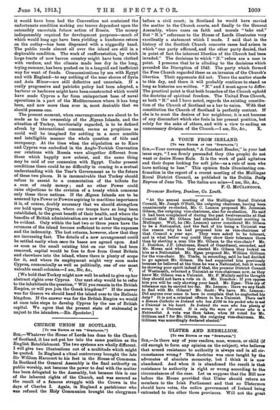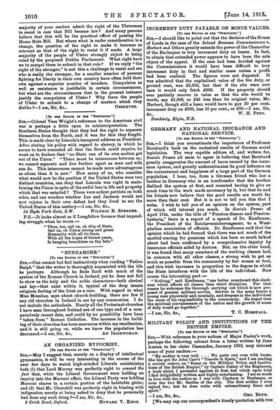ULSTER AND REBELLION.
[To THE EDITOS OP THE " SPECTATOR:1 SIR,—Is there any of your readers, man, woman, or child (if old enough to form any opinion on the subject), who believes that armed resistance to authority is always and in all cir- cumstances wrong P This doctrine was once taught by the advocates of absolute monarchy, but I think it is now abandoned. And when it is abandoned the result is that resistance to authority is right or wrong according to the circumstances of the case. Let us suppose that the Bill now before the House provided that Ulster should return no members to the Irish Parliament and that no Ulstermen should have votes, the entire government of Ireland being entrusted to the other three provinces. Will not the great
majority of your readers admit the right of the Ulstermen to resist in case that Bill became law ? And many persons believe that this will be the practical effect of passing the Home Rule Bill. But where what is under consideration is a change, the question of the right to make it becomes as relevant as that of the right to resist it if made. A large majority of the people of Ulster strongly object to being ruled by the proposed Dublin Parliament. What right have we to compel them to submit to that rule If we reply " the right of the stronger•," is not this a challenge to resist and see who is really the stronger, for a smaller number of persons fighting for liberty in their own country have often held their• own against a superior number• of invaders. Compulsion as well as resistance is justifiable in certain circumstances, but what are the circumstances that in the present instance justify the compulsion of Ulster ? Why force the people of Ulster to submit to a change of masters which they















































 Previous page
Previous page